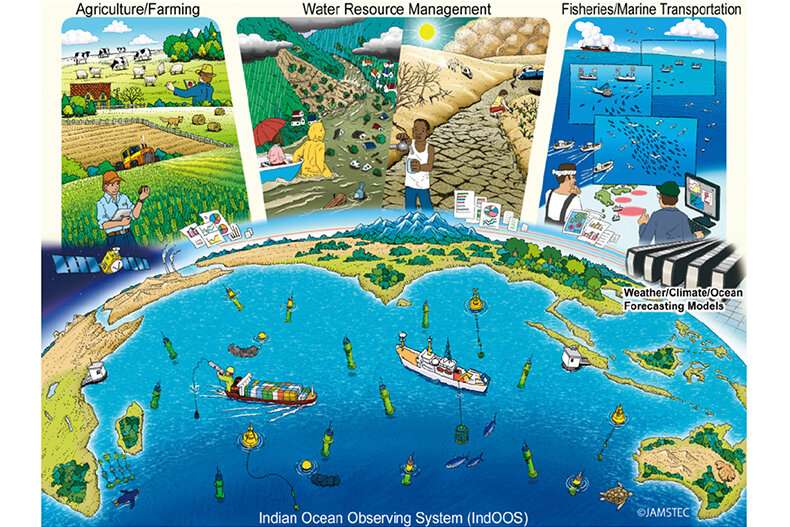#Scientists offer road map to improve environmental observations in the Indian Ocean

“#Scientists offer road map to improve environmental observations in the Indian Ocean”

A group of more than 60 scientists have provided recommendations to improve the Indian Ocean Observing System (IndOOS), a basin-wide monitoring system to better understand the impacts of human-caused climate change in a region that has been warming faster than any other ocean.
The group, led by Lisa Beal, professor of ocean sciences at the University of Miami (UM) Rosenstiel School of Marine and Atmospheric Science, provides a road map for an enhanced IndOOS to better meet the scientific and societal needs for more reliable environmental forecasts in the next decade. The 136 actionable recommendations from the three-year, internationally coordinated review were published in the Bulletin of the American Meteorological Society.
The scientists call for four major improvements to the current observing system: 1) more chemical and biological measurements in at-risk ecosystems and fisheries; 2) expansion into the western tropics to improve understanding of the monsoon; 3) better-resolved upper ocean processes to improve predictions of rainfall, drought, and heat waves; and 4) expansion into key coastal regions and the deep ocean to better constrain the basin-wide energy budget.
Although the smallest of the major oceans on Earth, the Indian Ocean is home to roughly one-third of the global population living among the 22 countries that border its rim. Many of these countries are developing or emerging economies vulnerable to climate changes such as sea level rise and more extreme weather events. The Indian Ocean also influences climate globally and is thought to have played a key role in regulating global mean surface temperatures.
The Indian Ocean Observing System, established in 2006, is a multinational network of sustained oceanic measurements that underpin understanding and forecasting of weather and climate for the Indian Ocean region and beyond. IndOOS is part of the Global Ocean Observing System (GOOS) which is coordinated through the World Meteorological Organization and the Intergovernmental Oceanographic Commission of the United Nations.
IndOOS-2 will require new agreements and partnerships with and among Indian Ocean rim countries, creating opportunities for them to enhance their monitoring and forecasting capacity, said the authors.
Upper ocean temperatures hit record high in 2020
L. M. Beal et al, A Road Map to IndOOS-2: Better Observations of the Rapidly Warming Indian Ocean, Bulletin of the American Meteorological Society (2020). DOI: 10.1175/BAMS-D-19-0209.1
Citation:
Scientists offer road map to improve environmental observations in the Indian Ocean (2021, January 15)
retrieved 15 January 2021
from https://phys.org/news/2021-01-scientists-road-environmental-indian-ocean.html
This document is subject to copyright. Apart from any fair dealing for the purpose of private study or research, no
part may be reproduced without the written permission. The content is provided for information purposes only.
If you liked the article, do not forget to share it with your friends. Follow us on Google News too, click on the star and choose us from your favorites.
For forums sites go to Forum.BuradaBiliyorum.Com
If you want to read more Like this articles, you can visit our Science category.



